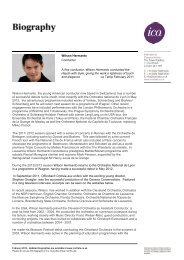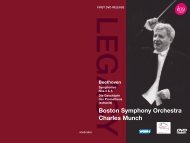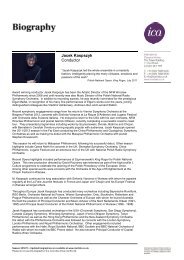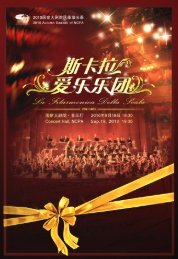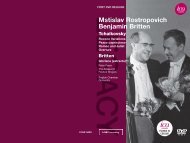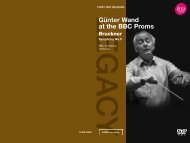Gennadi Rozhdestvensky - International Classical Artists
Gennadi Rozhdestvensky - International Classical Artists
Gennadi Rozhdestvensky - International Classical Artists
You also want an ePaper? Increase the reach of your titles
YUMPU automatically turns print PDFs into web optimized ePapers that Google loves.
ICAC 5053<br />
GUSTAV HOLST 1874–1934<br />
The Planets op.32<br />
1 I Mars, the Bringer of War: Allegro 7.46<br />
2 II Venus, the Bringer of Peace: Adagio 8.34<br />
3 III Mercury, the Winged Messenger: Vivace 3.50<br />
4 IV Jupiter, the Bringer of Jollity: Allegro giocoso – Andante maestoso 8.16<br />
5 V Saturn, the Bringer of Old Age: Adagio 9.05<br />
6 VI Uranus, the Magician: Allegro 5.54<br />
7 VII Neptune, the Mystic: Andante* 7.59<br />
BENJAMIN BRITTEN 1913–1976<br />
8 Variations and Fugue on a Theme of Purcell op.34 – 16.32<br />
The Young Person’s Guide to the Orchestra<br />
Copyright 1947 by Hawkes & Son (London) Ltd<br />
*Ladies of the BBC Symphony Chorus<br />
BBC Symphony Orchestra<br />
GENNADI ROZHDESTVENSKY<br />
Recorded: Royal Festival Hall, London, 12 March 1980 (Holst)<br />
& Festival Hall, Osaka, Japan, 1 June 1981 (Britten)<br />
Holst<br />
The Planets<br />
Britten<br />
Variations & Fugue<br />
on a Theme of<br />
Purcell op.34<br />
BBC Symphony Orchestra<br />
<strong>Gennadi</strong><br />
<strong>Rozhdestvensky</strong>
ROZHDESTVENSKY CONDUCTS<br />
BRITTEN AND HOLST<br />
A musical curiosity knowing few national boundaries<br />
has been a constant motor of the career of <strong>Gennadi</strong><br />
<strong>Rozhdestvensky</strong> (born in May 1931). At a press conference<br />
to announce his taking on the chief conductorship of the<br />
BBC Symphony Orchestra, the Russian maestro surprised<br />
journalists by asking ‘Who are the most significant British<br />
composers after Peter Maxwell Davies?’. His first major<br />
London concert with the orchestra (October 1978)<br />
combined two Prokofiev rarities with Elgar’s Second<br />
Symphony – The Musical Times called it ‘a cruel test piece<br />
for a non-English conductor’s initiation before an English<br />
audience’ but praised ‘BBC enterprise’ for both its choice<br />
of programme and music director. <strong>Rozhdestvensky</strong>’s<br />
subsequent concerts with the orchestra during his tenure<br />
(1978–81) were never shy of national composers – Britten<br />
(an especial favourite since his leading the Russian<br />
premiere of A Midsummer Night’s Dream in 1963),<br />
Vaughan Williams, Walton and Elgar, Maxwell Davies (the<br />
premiere of Symphony No.2 and St Thomas Wake) and<br />
John Tavener. He has continued to perform British music<br />
elsewhere: his CV lists complete cycles of the Vaughan<br />
Williams symphonies on disc for Melodiya and in concert<br />
in St Petersburg and Polotsk.<br />
Born in Moscow, <strong>Rozhdestvensky</strong> was the son of<br />
soprano Natalia Rozhdestvenskaya (whose family name<br />
he took for his own professional name) and conductor<br />
Nikolai Ansonov, under whom he studied at the Moscow<br />
Conservatoire. He was still a student there when he was<br />
engaged at the Bolshoi Theatre at the age of twenty,<br />
making his debut conducting Tchaikovsky’s ballet The<br />
Sleeping Beauty (the work he chose for his first recording<br />
with the BBC orchestra). <strong>Rozhdestvensky</strong>’s long-term<br />
relationship with the Bolshoi (on the staff since 1951,<br />
principal conductor between 1964 and 1970, chairman<br />
of the artistic committee since 1994 and, in 2000–01, a<br />
brief period as General Music Director) did not prevent<br />
his working for thirteen years with Moscow’s Symphony<br />
Orchestra of All-Union Radio and Television. In the 1970s,<br />
he also headed the Moscow Chamber Opera and<br />
succeeded to his father’s old position of the chair of<br />
conducting at the Moscow Conservatoire. In 1982, he<br />
became artistic director of the newly founded Symphony<br />
Orchestra of the Ministry of Education and Arts. He became<br />
also the first Russian to hold a series of principal<br />
conductorships outside the Soviet Union, starting with the<br />
BBC appointment in 1978 then going on to the Vienna<br />
Symphony Orchestra (1980 –82) and in 1992 –95 the<br />
Stockholm Philharmonic Orchestra. He also guest<br />
conducted at the Royal Opera House, Paris Opera, and<br />
Milan’s La Scala. A discography currently running at over<br />
500 releases comprises some 800 different works,<br />
including the complete symphonies of Shostakovich,<br />
Prokofiev, Vaughan Williams, Glazunov, Sibelius and<br />
Bruckner and much Tchaikovsky, Rachmaninov, Schnittke,<br />
Denisov and Gubaidulina.<br />
In an interview <strong>Rozhdestvensky</strong> was asked if the<br />
‘Russian sound’, which he achieved with the BBC players<br />
after just a short period of working together, was due to<br />
‘work in rehearsal, or did it just come from an instinctive<br />
connection between you and the players?’. He replied ‘the<br />
latter – if indeed the sound is Russian’. He agreed that<br />
‘curiosity for the new and the rediscovered’ was ‘a major<br />
force’ for him. Charles Martin, a cellist with the BBC SO<br />
from <strong>Rozhdestvensky</strong>’s time onwards, explained that ‘in the<br />
Russian way, he expected you to be able to play, and he<br />
would conduct. He wanted to get everything assimilated as<br />
quickly as possible in the minimum amount of rehearsal.<br />
Anyone can stand up there and just beat time, but I know<br />
of few conductors who use the baton for purely musical<br />
reasons – <strong>Rozhdestvensky</strong> was a master of that. Although<br />
his English was better than he made out, he didn’t talk<br />
much. He did it all with the stick. He thought it should be<br />
as spontaneous as possible.’<br />
The BBC SO tour of Japan, from which the present<br />
Britten Young Person’s Guide performance comes, featured<br />
a generous – and, for <strong>Rozhdestvensky</strong>, characteristically<br />
unconventional – input of British music: The Planets,<br />
Britten’s Sinfonia da Requiem, Tippett’s Concerto for<br />
Double String Orchestra, Vaughan Williams’s Tuba<br />
Concerto and Maxwell Davies’s St Thomas Wake<br />
(<strong>Rozhdestvensky</strong> was always intrigued by scores with<br />
particular performing difficulties).<br />
Neither The Planets nor the Britten Guide was new to<br />
<strong>Rozhdestvensky</strong> (he had actually performed the latter with<br />
the Leningrad Philharmonic at the Edinburgh Festival in<br />
September 1960). But the choice of The Planets with the<br />
chief BBC orchestra was at least as daring a stroke as<br />
inaugurating his music directorship with the Elgar Second.<br />
Holst’s suite was, after all, the cheval de bataille of the<br />
orchestra’s previous knighted British music directors Sir<br />
Adrian Boult and Sir Malcolm Sargent. <strong>Rozhdestvensky</strong>’s<br />
approach to The Planets is wholly typical of his work with<br />
the orchestra. The score has clearly been looked at with an<br />
open mind rather than drilled – the wind and the brass<br />
have all the room in the world to make their individual<br />
contributions (shades of Sir Thomas Beecham’s famous<br />
self-deprecating comment ‘I pick the players, and I let<br />
them play’). Although there is little trace of the obvious<br />
‘foreign’ accent that, say, Karajan brought to this score<br />
in his Wagner-like Vienna and Berlin recordings, there is<br />
a lack of assumed sentiment – this is not a Planets<br />
conducted by a man who is mentally singing ‘I Vow To<br />
2 3<br />
Thee My Country’ in Jupiter or leading the slower, more<br />
mysterious final movements with a half-memory of their<br />
use on television astrology programmes. Elsewhere<br />
<strong>Rozhdestvensky</strong> is not afraid to allow the percussion to take<br />
their proper forward (and hence, more contemporary) place<br />
in the orchestral spectrum. In similar vein, the Britten is<br />
very much Variations and Fugue on a Theme of Purcell<br />
rather than the soundtrack to a children’s guide, the final<br />
fugue a taut demonstration of orchestral virtuosity.<br />
Mike Ashman
ROJDESTVENSKY DIRIGE<br />
BRITTEN ET HOLST<br />
Tout au long de sa carrière, Guennadi Rojdestvensky (né en<br />
mai 1931) a été propulsé par une curiosité musicale<br />
faisant peu de cas des frontières nationales. Lors de la<br />
conférence de presse annonçant qu’il prenait le poste de<br />
chef titulaire de l’Orchestre Symphonique de la BBC, il<br />
surprit les journalistes en demandant : “Quels sont les<br />
compositeurs britanniques de premier plan après Peter<br />
Maxwell Davies?”. Son premier grand concert londonien<br />
avec l’orchestre, en octobre 1978, associait deux raretés<br />
de Prokofiev avec la Deuxième Symphonie d’Elgar – que le<br />
Musical Times qualifia de “cruelle œuvre test pour les<br />
débuts d’un chef n’étant pas anglais devant un public<br />
anglais”, mais il complimenta l’esprit d’intiative de la BBC<br />
pour le choix du programme et du directeur musical. Les<br />
autres concerts que donna Rojdestvensky avec l’orchestre<br />
durant son mandat (1978–1981) ne furent jamais avares<br />
de compositeurs britanniques. On l’entendit dans Britten<br />
(l’un de ses compositeurs de prédilection depuis qu’il<br />
avait dirigé la création russe du Songe d’une nuit d’été en<br />
1963), Vaughan Williams, Walton, Elgar, Maxwell Davies<br />
(la création de la Deuxième Symphonie et de St Thomas<br />
Wake) et John Tavener. Et il ne cessa de diriger de la<br />
musique britannique ailleurs : on relève dans sa biographie<br />
des intégrales des symphonies de Vaughan Williams au<br />
disque (pour Melodiya) et en concert, à Saint-Pétersbourg<br />
et Polotsk.<br />
Né à Moscou, Rojdestvensky est le fils de la soprano<br />
Natalia Rojdestvenskaïa (patronyme qu’il adoptera comme<br />
nom d’artiste) et du chef Nikolaï Ansonov, dont il suit la<br />
classe au Conservatoire de Moscou. Encore élève au<br />
Conservatoire, il est engagé, à l’âge de 20 ans, au Théâtre<br />
du Bolchoï où il fait ses débuts dans le ballet La Belle au<br />
4<br />
bois dormant de Tchaïkovsky (l’œuvre qu’il choisira pour<br />
son premier enregistrement avec l’orchestre de la BBC).<br />
Les liens qu’entretient Rojdestvensky durant des décennies<br />
avec le Bolchoï – il fait partie du personnel dès 1951, est<br />
chef titulaire entre 1964 et 1970, président du comité<br />
artistique à partir de 1994 jusqu’à ce jour et, durant une<br />
brève période, en 2000–2001, “directeur musical général”<br />
– ne l’empêchent pas de travailler pendant treize ans<br />
avec l’Orchestre Symphonique de la Radio Télévision<br />
Soviétique. Dans les années 1970, il est également à la<br />
tête de l’Opéra de Chambre de Moscou et il succède à son<br />
père au poste de professeur de direction au Conservatoire<br />
de Moscou. En 1982, il prend ses fonctions à la tête du<br />
nouvel Orchestre Symphonique du Ministère de l’Éducation<br />
et des Arts. Il devient aussi le premier Russe assurant<br />
la direction musicale de plusieurs orchestres non<br />
soviétiques : après son passage à la BBC vient ensuite<br />
l’Orchestre Symphonique de Vienne (1980–1982) et en<br />
1992–1995 l’Orchestre Philharmonique de Stockholm. Il<br />
est également invité à diriger à Covent Garden, à l’Opéra<br />
de Paris et à La Scala de Milan. Dans sa discographie, qui<br />
comporte actuellement plus de cinq cents références,<br />
figurent quelque huit cents œuvres différentes, dont les<br />
intégrales des symphonies de Chostakovitch, Prokofiev,<br />
Vaughan Williams, Glazounov, Sibelius et Bruckner, et de<br />
nombreuses pages de Tchaïkovsky, Rachmaninov,<br />
Schnittke, Denisov et Goubaïdoulina.<br />
Au cours d’un entretien, un journaliste demanda à<br />
Rojdestvensky si le “son russe” qu’il avait réussi à tirer<br />
de l’orchestre de la BBC après une brève période de<br />
travail en commun s’expliquait par “le travail en répétition,<br />
ou simplement par un lien instinctif entre [lui] et les<br />
musiciens?”. Il répondit : “La deuxième hypothèse est la<br />
bonne – pour autant que le son soit russe”. Il admit que<br />
“l’attrait du nouveau et de la redécouverte [était] une force<br />
motrice essentielle” en lui. Charles Martin, violoncelliste<br />
à l’orchestre de la BBC à partir de l’époque de<br />
Rojdestvensky, raconte : “À la manière russe, il attendait<br />
de vous que vous puissiez jouer, et il dirigerait. Il voulait<br />
que tout soit assimilé aussi vite que possible dans le<br />
nombre minimum de répétitions. N’importe qui peut<br />
monter au pupitre de chef et se contenter de battre la<br />
mesure, mais je connais peu de chefs qui utilisent la<br />
baguette pour des raisons purement musicales –<br />
Rojdestvensky était un maître en la matière. Bien que<br />
son anglais fût meilleur qu’il ne le prétendait, il ne parlait<br />
pas beaucoup. Il faisait tout avec sa baguette. Il estimait<br />
que ça devait être aussi spontané que possible.”<br />
Au programme de la tournée au Japon de l’orchestre de<br />
la BBC, d’où provient le Young Person’s Guide de Britten<br />
repris ici, figurait une bonne dose de musique britannique<br />
– nouveau reflet d’un Rojdestvensky aimant sortir des<br />
sentiers battus : outre Les Planètes de Holst, la Sinfonia da<br />
Requiem de Britten, le Concerto pour double orchestre à<br />
cordes de Tippett, le Concerto pour tuba de Vaughan<br />
Williams et St Thomas Wake de Maxwell Davies (les<br />
partitions comportant des difficultés particulières<br />
d’exécution avaient le don d’attirer Rojdestvensky).<br />
Ni Les Planètes ni le Guide de Britten n’étaient<br />
nouveaux pour Rojdestvensky (il avait donné le Guide avec<br />
le Philharmonique de Leningrad au Festival d’Édimbourg<br />
en septembre 1960). Mais choisir de diriger Les Planètes<br />
avec la principale phalange de la BBC était au moins aussi<br />
osé que mettre la Deuxième d’Elgar au programme de son<br />
concert inaugural de directeur musical. La suite de Holst<br />
était tout de même le cheval de bataille de deux anciens<br />
directeurs musicaux britanniques de l’orchestre anoblis<br />
par Sa Majesté : Sir Adrian Boult et Sir Malcolm Sargent.<br />
La manière dont Rojdestvensky aborde Les Planètes est<br />
absolument typique de son travail avec les musiciens.<br />
5<br />
La partition a été travaillée avec un esprit ouvert plutôt<br />
qu’inculquée, et les bois et les cuivres ont tout l’espace du<br />
monde pour apporter leurs contributions personnelles (il y<br />
a là un peu de l’excessive modestie qu’exprimait Sir<br />
Thomas Beecham avec sa fameuse remarque : “Je choisis<br />
les musiciens et je les laisse jouer”). Bien qu’on ne trouve<br />
pratiquement pas de traces de cet accent “étranger”<br />
manifeste qu’un Karajan donnait à la partition dans ses<br />
enregistrements viennois et berlinois à la Wagner, par<br />
exemple, il manque un sentiment vécu : ce ne sont pas<br />
des Planètes dirigées par un homme qui, dans Jupiter,<br />
chante mentalement l’hymne patriotique britannique<br />
“I Vow To Thee My Country” ou interprète les derniers<br />
mouvements, plus lents et mystérieux, en ayant à moitié<br />
en mémoire la façon dont ils sont utilisés dans les<br />
émissions télévisées d’astrologie. Ailleurs, Rojdestvensky<br />
n’a pas peur de laisser les percussions prendre leur<br />
place proéminente (et donc plus contemporaine) dans<br />
le spectre orchestral. Dans une veine similaire, le Britten<br />
est beaucoup plus Variations et Fugue sur un thème de<br />
Purcell que la bande-son d’un guide destiné aux enfants,<br />
la fugue finale se révélant une intense démonstration de<br />
virtuosité orchestrale.<br />
Mike Ashman<br />
Traduction : Daniel Fesquet
ROSHDESTVENSKIJ DIRIGIERT<br />
BRITTEN UND HOLST<br />
Seine musikalische Kuriosität, die wenige nationalen<br />
Grenzen kennt, ist eine konstante Triebkraft in der Karriere<br />
des im Mai 1931 geborenen <strong>Gennadi</strong> Roshdestvenskij. In<br />
einer Pressekonferenz, in der seine Annahme der<br />
Chefdirigentenposition des BBC Symphony Orchestras<br />
angekündigt wurde, überraschte der russische Maestro die<br />
Journalisten mit der Frage: “Wer sind die signifikantesten<br />
britischen Komponisten seit Peter Maxwell Davies?” Sein<br />
erstes bedeutendes Konzert mit dem Orchester in London<br />
(im Oktober 1978) kombinierte zwei Raritäten von<br />
Prokofjev mit Elgars 2. Sinfonie – die Musical Times<br />
nannte es “ein grausames Teststück für die Initiation eines<br />
nicht englischen Dirigenten vor einem englischen<br />
Publikum”, lobte allerdings den “Unternehmungsgeist der<br />
BBC” sowohl für die Wahl des Programms als auch des<br />
Musikdirektors. Auch in Roshdestvenskijs späteren<br />
Konzerten mit dem Orchester während seiner Ägide<br />
(1978–1981) scheute er sich nicht vor einheimischen<br />
Komponisten: Britten (ein besonderer Favorit seit er 1963<br />
die russische Premiere seines A Midsummer Night’s<br />
Dream geleitet hatte), Vaughan Williams, Walton und Elgar,<br />
Maxwell Davies (die Uraufführung der Sinfonie Nr. 2 und<br />
St Thomas Wake) und John Tavener. Er führte auch<br />
andernorts weiter britische Musik auf: seine Vita enthält<br />
komplette Zyklen der Vaughan Williams-Sinfonien auf<br />
Schallplatte für Melodija und im Konzert in St. Petersburg<br />
und Polazk.<br />
Roshdestvenskij wurde in Moskau geboren und war der<br />
Sohn der Sopranistin Natalya Roshdestvenskaja (deren<br />
Familiennamen er als seinen eigenen Künstlernamen<br />
annahm) und des Dirigenten Nikolai Ansonov, bei dem er<br />
auch am Moskauer Konservatorium studierte. Er war erst<br />
6<br />
20 und noch Student, als er am Bolschoitheater engagiert<br />
wurde, wo er mit Tschaikovskijs Ballett Dornröschen als<br />
Dirigent debütierte (dieses Werk wählte er auch für seine<br />
erste Aufnahme mit dem BBC Symphony Orchestra).<br />
Roshdestvenskijs langwährende Beziehung mit dem<br />
Bolshoi (seit 1951 angestellt, 1964–1970 Chefdirigent, ab<br />
1994 Vorsitzender des künstlerischen Komitees und eine<br />
kurze Zeit als Generalmusikdirektor 2000–2001) hinderten<br />
ihn nicht daran, 13 Jahre lang mit dem Rundfunk-<br />
Symphonieorchester der UdSSR zu arbeiten. In den 1970er<br />
Jahren leitete er auch die Moskauer Kammeroper und<br />
übernahm die Professur in Dirigieren am Moskauer<br />
Konservatorium von seinem Vater. 1982 wurde er<br />
Künstlerischer Leiter des neu gegründeten Staatlichen<br />
Sinfonie-Orchesters des Kultusministeriums der UdSSR.<br />
Er war auch der erste Russe, der eine Anzahl von<br />
Chefdirigentenposten außerhalb der Sowjetunion innehatte,<br />
ab 1978 zuerst an der BBC, gefolgt von den Wiener<br />
Symphonikern (1980–82) und den Stockholmer<br />
Philharmonikern von 1992–95. Außerdem trat er als<br />
Gastdirigent am Royal Opera House Covent Garden, der<br />
Pariser Oper und der Mailänder Scala auf. Seine<br />
Diskografie enthält derzeit über 500 Titel und 800<br />
verschiedene Werke, einschließlich der vollständigen<br />
Sinfonien von Schostakovitsch, Prokofjev, Vaughan<br />
Williams, Glasunov, Sibelius und Bruckner sowie viele<br />
Werke von Tschaikovskij, Rachmaninov, Schnittke, Denisov<br />
und Gubaidulina.<br />
In einem Interview wurde Roshdestvenskij gefragt,<br />
ob der “russische Klang”, den er nach nur kurzer<br />
Zusammenarbeit mit den Musikern der BBC erreichte, “der<br />
Probenarbeit oder einer instinktiven Verbindung zwischen<br />
Ihnen und den Spielern” zuzuschreiben sei. Er antwortete:<br />
“Letzterem – wenn der Klang tatsächlich russisch ist.”<br />
Charles Martin, seit Roshdestvenskijs Zeit Cellist des BBC<br />
SO, erklärte, dass er “in russischer Manier von [den<br />
Musikern] erwartete, dass sie spielen konnten, und er<br />
dirigierte. Er wollte alles in der kürzestmöglichen Probezeit<br />
so schnell wie möglich assimilieren. Jedweder kann auf<br />
dem Podium stehen und den Takt schlagen, aber ich kenne<br />
wenige Dirigenten, die den Taktstock rein musikalisch<br />
verwenden – Roshdestvenskij war ein Meister darin.<br />
Obwohl sein Englisch besser war als er vorgab, machte er<br />
wenige Worte. Er zeigte alles mit dem Taktstock. Er<br />
glaubte, dass alles so natürlich wie möglich sein sollte.”<br />
Die Japantournee des BBC SO, aus der die vorliegende<br />
Aufführung von Brittens Young Person’s Guide to the<br />
Orchestra stammt, enthielt eine großzüge – und für<br />
Roshdestvenskij typisch unkonventionelle – Auswahl<br />
britischer Musik: Die Planeten, Brittens Sinfonia da<br />
Requiem, Tippetts Concerto für zwei Streichorchester,<br />
Vaughan Williams’s Tubakonzert und Maxwell Davies’<br />
St Thomas Wake (Roshdestvenskij war von jeher von<br />
Partituren fasziniert, deren Aufführung besondere<br />
Herausforderungen stellt).<br />
Weder Die Planeten noch Brittens Guide waren neu in<br />
Roshdestvenskijs Repertoire (den Britten hatte er bereits im<br />
September 1960 mit den Leningrader Philharmonikern auf<br />
dem Edinburgh Festival aufgeführt). Aber die Wahl der<br />
Planeten mit dem Hauptorchester der BBC war mindestens<br />
genauso wagemutig wie seine Inauguration als<br />
Musikdirektor mit Elgars Zweiter. Holsts Suite war<br />
schließlich das Schlachtross der früheren ritterlichen<br />
Musikdirektoren des Orchesters: Sir Adrian Boult und Sir<br />
Malcolm Sargent. Roshdestvenskijs Ansatz zu den Planeten<br />
ist ganz typisch für seine Arbeit mit dem Orchester. Die<br />
Partitur wurde offensichtlich mit offener Gesinnung<br />
angegangen statt gedrillt – Holz und Blech erhalten freien<br />
Spielraum für ihre individuellen Beiträge (ein Echo von Sir<br />
Thomas Beechams berühmter bescheidener Bemerkung<br />
7<br />
“Ich wähle die Spieler aus und lasse sie spielen”). Obwohl<br />
es wenige Spuren eines offensichtlich “ausländischen”<br />
Akzents gibt, wie etwa in Karajans wagnerisch gefärbten<br />
Wiener und Berliner Aufnahmen, findet sich in<br />
Roshdestvenskij keine Gemütsseligkeit – diese Planeten<br />
werden nicht von einem Manne dirigiert, der in Jupiter<br />
innerlich das patriotische “I Vow To Thee My Country”<br />
singt oder die langsameren, mysteriöseren Schluss-Sätze<br />
mit einer Halberinnerung an ihren Gebrauch in<br />
Astrologieprogrammen im Fernsehen dirigiert. Anderwärts<br />
scheut sich Roshdestvenskij nicht, das Schlagwerk seinen<br />
angemessen (also zeitgenössischeren) Platz im<br />
Vordergrund des Orchesterspektrums einnehmen zu lassen.<br />
Ähnlich ist der Britten weniger ein Soundtrack zu einem<br />
Kinderprogramm sondern vielmehr Variationen und Fuge<br />
über ein Thema von Purcell, dessen Schlussfuge eine<br />
straffe Demonstration orchestraler Virtuosität darbietet.<br />
Mike Ashman<br />
Übersetzung: Renate Wendel
For ICA Classics<br />
Executive Producer/Head of Audio: John Pattrick<br />
Music Rights Executive: Aurélie Baujean<br />
Remastering: Paul Baily (Re.Sound)<br />
Head of DVD: Louise Waller-Smith<br />
Executive Consultant: Stephen Wright<br />
Also available on CD and digital download:<br />
ICA Classics acknowledges the assistance of Derek Horsman,<br />
<strong>Gennadi</strong> <strong>Rozhdestvensky</strong> and Robert Slotover<br />
With special thanks to Paul Brooks<br />
Introductory note & translations<br />
© 2012 <strong>International</strong> <strong>Classical</strong> <strong>Artists</strong> Ltd<br />
Booklet editing: WLP Ltd<br />
Art direction: Georgina Curtis for WLP Ltd<br />
π 2012 BBC Worldwide Limited, under licence to<br />
<strong>International</strong> <strong>Classical</strong> <strong>Artists</strong> Ltd<br />
© 2012 <strong>International</strong> <strong>Classical</strong> <strong>Artists</strong> Ltd<br />
ICAC 5000<br />
Beethoven: Piano Concertos Nos. 1 & 3<br />
New Philharmonia Orchestra · Sir Adrian Boult<br />
Emil Gilels<br />
ICAC 5002<br />
Brahms: Ein deutsches Requiem<br />
Mozart: Serenata notturna<br />
Elisabeth Grümmer · Hermann Prey · Kölner Rundfunkchor·<br />
Kölner Rundfunk-Sinfonie-Orchester · Otto Klemperer<br />
ICAC 5003<br />
Brahms: Piano Concerto No.2 · Chopin · Falla<br />
Kölner Rundfunk-Sinfonie-Orchester<br />
Christoph von Dohnányi · Arthur Rubinstein<br />
Gramophone Editor’s Choice<br />
Technical Information<br />
Pyramix software<br />
Yamaha 03D mixing console<br />
CEDAR including Retouch<br />
dCS convertors<br />
TC Electronic M5000 (digital audio mainframe)<br />
Studer A820 1/4" tape machine with Dolby A noise reduction<br />
ATC 100 active monitors<br />
Stereo ADD<br />
WARNING:<br />
All rights reserved. Unauthorised copying, reproduction, hiring,<br />
lending, public performance and broadcasting prohibited.<br />
Licences for public performance or broadcasting may be obtained<br />
from Phonographic Performance Ltd., 1 Upper James Street,<br />
London W1F 9DE. In the United States of America unauthorised<br />
reproduction of this recording is prohibited by Federal law and<br />
subject to criminal prosecution.<br />
ICAC 5001<br />
Mahler: Symphony No.2 ‘Resurrection’<br />
Stefania Woytowicz · Anny Delorie<br />
Kölner Rundfunkchor · Kölner Rundfunk-Sinfonie-Orchester<br />
William Steinberg<br />
ICAC 5004<br />
Haydn: Piano Sonata No.62<br />
Weber: Piano Sonata No.3<br />
Schumann · Chopin · Debussy<br />
Sviatoslav Richter<br />
ICAC 5005<br />
Bruckner: Symphony No.3 ed. Nowak<br />
BBC Northern Symphony Orchestra<br />
Kurt Sanderling<br />
Made in Austria<br />
8<br />
9
ICAC 5006<br />
Verdi: La Traviata<br />
Maria Callas · Cesare Valletti · Mario Zanasi<br />
Royal Opera House Orchestra & Chorus<br />
Nicola Rescigno<br />
ICAC 5007<br />
Tchaikovsky: Symphony No.1 ‘Winter Dreams’<br />
Stravinsky: The Firebird Suite (1945 version)<br />
BBC Symphony Orchestra · Philharmonia Orchestra<br />
Evgeny Svetlanov<br />
ICAC 5020<br />
Rachmaninov: Rhapsody on a Theme of Paganini<br />
Prokofiev: Piano Sonata No.7<br />
Stravinsky: Three Scenes from Petrushka<br />
Shura Cherkassky<br />
ICAC 5021<br />
Mahler: Symphony No.3 · Debussy: La Mer<br />
Kölner Rundfunk-Sinfonie-Orchester<br />
Dimitri Mitropoulos · Winner of the Gustav Mahler ‘Toblacher<br />
Komponierhäuschen’ <strong>International</strong>e Schallplattenpreis 2011<br />
ICAC 5008<br />
Liszt: Rhapsodie espagnole<br />
Hungarian Rhapsody No.2<br />
CPE Bach · Couperin · Scarlatti<br />
Georges Cziffra<br />
ICAC 5019<br />
Brahms: Symphony No.1<br />
Elgar: Enigma Variations<br />
BBC Symphony Orchestra<br />
Sir Adrian Boult<br />
ICAC 5022<br />
Puccini: Tosca<br />
Renata Tebaldi · Ferruccio Tagliavini · Tito Gobbi<br />
The Covent Garden Opera Chorus<br />
The Covent Garden Orchestra · Francesco Molinari-Pradelli<br />
ICAC 5023<br />
Brahms: Symphony No.3<br />
Tchaikovsky: Symphony No.6 ‘Pathétique’<br />
Novaya Rossiya State Symphony Orchestra<br />
Yuri Bashmet<br />
10 11
ICAC 5032<br />
Beethoven: Piano Concerto No.4<br />
Tchaikovsky: Piano Concerto No.2<br />
Emil Gilels · Hallé Orchestra · Sir John Barbirolli<br />
London Philharmonic Orchestra · Kirill Kondrashin<br />
ICAC 5033<br />
Mahler: Symphony No.3<br />
Waltraud Meier · Eton College Boys’ Choir<br />
London Philharmonic Choir & Orchestra<br />
Klaus Tennstedt<br />
ICAC 5036<br />
Shostakovich: Symphony No.10<br />
Tchaikovsky · Rimsky-Korsakov<br />
USSR State Symphony Orchestra<br />
Evgeny Svetlanov<br />
ICAC 5045<br />
Chopin: Piano Concerto No.1<br />
Beethoven: Piano Concerto No.4<br />
Otto Klemperer · Christoph von Dohnányi<br />
Kölner Rundfunk-Sinfonie-Orchester · Claudio Arrau<br />
ICAC 5034<br />
Beethoven: Symphony No.9<br />
Irmgard Seefried · Rosette Anday · Anton Dermota<br />
Paul Schöffler · Wiener Singakademie<br />
Wiener Philharmoniker · Wilhelm Furtwängler<br />
ICAC 5035<br />
Tchaikovsky: Symphony No.4 · Mussorgsky: A Night<br />
on the Bare Mountain (Sorochinsky Fair version)<br />
Prokofiev: The Love for Three Oranges Suite<br />
<strong>Gennadi</strong> <strong>Rozhdestvensky</strong><br />
ICAC 5046<br />
Rossini: Il barbiere di Siviglia<br />
The Covent Garden Opera Chorus<br />
The Covent Garden Orchestra<br />
Carlo Maria Giulini<br />
ICAC 5047<br />
Mendelssohn: A Midsummer Night’s Dream<br />
Beethoven: Symphony No.8<br />
Kölner Rundfunkchor · Kölner Rundfunk-Sinfonie-Orchester<br />
Otto Klemperer<br />
12<br />
13
ICAC 5048<br />
Brahms: Piano Concerto No.1<br />
Chopin · Liszt · Schumann · Albéniz<br />
BBC Symphony Orchestra · Rudolf Kempe<br />
Julius Katchen<br />
ICAC 5054<br />
Beethoven: Missa solemnis<br />
Kölner Rundfunkchor<br />
Kölner Rundfunk-Sinfonie-Orchester<br />
William Steinberg<br />
ICAC 5062<br />
Schumann: Piano Concerto<br />
Beethoven: Eroica Variations · Piano Sonata No.30<br />
Annie Fischer<br />
Kölner Rundfunk-Sinfonie-Orchester · Joseph Keilberth<br />
ICAC 5063<br />
Brahms: Symphony No.3<br />
Elgar: Symphony No.1<br />
BBC Symphony Orchestra<br />
Sir Adrian Boult<br />
ICAC 5055<br />
Schubert: Impromptu in B flat<br />
Beethoven: Piano Sonatas Nos. 6 & 29<br />
Wilhelm Backhaus<br />
ICAC 5061<br />
Verdi: Falstaff<br />
Glyndebourne Opera Chorus<br />
Royal Philharmonic Orchestra<br />
Carlo Maria Giulini<br />
14<br />
15



